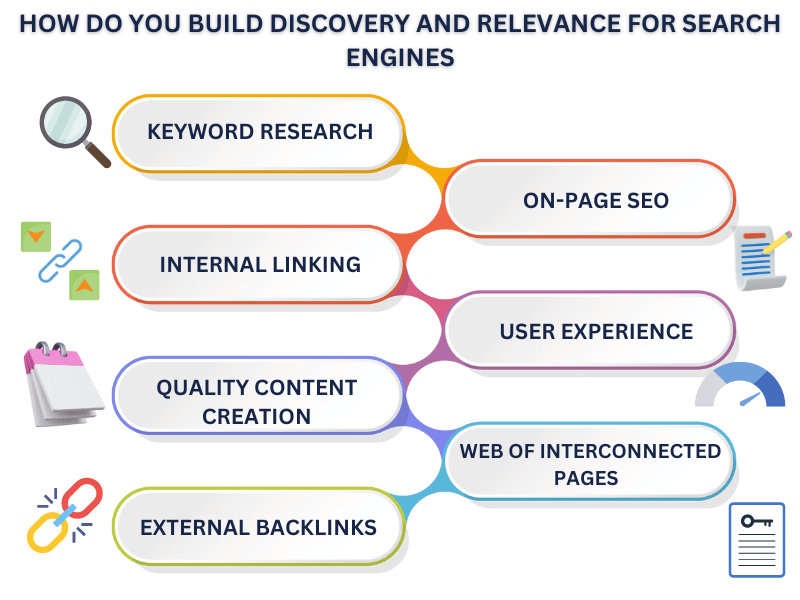When it comes to improving your website’s visibility, a crucial question is: How do you build discovery and relevance for search engines? Understanding the fundamentals of search engine optimization (SEO) can help you achieve higher rankings on search engine results pages (SERPs).
By implementing effective strategies, you can ensure that your content is both discoverable and relevant, leading to increased traffic and better online presence.. Lets explore the practical steps to achieve this.
Understanding Search Engine Discovery
1. What is Search Engine Discovery?
Search engine discovery is the process by which search engines find and index your web pages. This is the first step to appearing in search results.
2. How Do Search Engines Discover New Content?
- Crawling: Search engines use bots to crawl the web and find new content.
- Sitemaps: Submitting a sitemap helps search engines understand your site structure.
- Internal Links: Effective internal linking ensures search engines can navigate and index all your pages.
Enhancing Relevance for Search Engines
1. Keyword Research
Understanding what your audience is searching for is key.
- Use Tools: Tools like Google Keyword Planner, SEMrush, and Ahrefs can help identify relevant keywords.
- Analyze Competitors: See what keywords competitors are ranking for and find gaps you can fill, Tools like MOZ can help.
Learn more about Keyword Research in our blog A Guide to Keyword Targetting.
2. On-Page SEO
Optimizing individual pages for targeted keywords.
- Title Tags: Include your primary keyword in the title tag as this helps with SEO.
- Meta Descriptions: Write compelling meta descriptions that include keywords and are eye catching.
- Header Tags: Use H1, H2, H3 tags to structure content and include keywords as it is easier for search engines to rank webpages that use proper header tags.
- Content: Ensure your content is informative, engaging, and keyword-rich with a high readability score.
3. Quality Content Creation
Creating valuable content that answers users’ queries.
- Blogs: Regularly update your blog with fresh content as google’s algorithm keeps on changing.
- Multimedia: Use images, videos, and infographics to enhance engagement.
- User Intent: Write content that meets the user’s search intent like informative, commercial and transactional intent.
4. Technical SEO
Ensuring your website’s technical setup is optimal.
- Site Speed: Use tools like Google PageSpeed Insights to improve site speed as its one of the most important ranking factors.
- Mobile-Friendliness: Ensure your site is responsive on all devices like mobile, desktop and tablets.
- HTTPS: Secure your site with HTTPS as Google ranks them higher because of better security.

Off-Page SEO
1. Backlink Building
Acquiring links from other reputable websites is known as backlinking and improves ranking of your website. When other websites link to your websites it gains more credibility and trust in the eyes of Google.
- Guest Posting: Write articles for other websites in your industry.
- Partnerships: Build relationships with influencers and other sites.
- Content Promotion: Share your content on social media and other platforms to attract links.
2. Social Signals
Engagement on social media can indirectly impact your SEO.
- Active Profiles: Maintain active profiles on major social media platforms.
- Content Sharing: Regularly share your content to increase visibility.
- Engagement: Respond to comments and messages to build a community.
Measuring Success
1. Analytics Tools
Use tools to track and measure your SEO efforts.
- Google Analytics: Track traffic, user behavior and their bounce rates, and conversions.
- Google Search Console: Monitor your site’s presence in search results and where it stands.
- SEO Tools: Use tools like SEMrush and Ahrefs for in-depth analysis for SEO audit.
2. Key Performance Indicators (KPIs)
Identify and monitor KPIs to measure success.
- Organic Traffic: Track the number of visitors coming from search engines.
- Keyword Rankings: Monitor your rankings for target keywords.
- Conversion Rates: Measure how well your SEO efforts are converting visitors.
Continuous Improvement
1. Regular Audits
Perform regular SEO audits to identify and fix issues.
- Content Audits: Review and update old content.
- Technical Audits: Fix any technical issues that arise.
2. Staying Updated
SEO is constantly evolving. Stay informed about the latest trends and updates.
- Industry Blogs: Follow SEO blogs like Moz, Search Engine Journal, and Neil Patel.
- Webinars and Conferences: Attend SEO webinars and conferences to learn from experts.
FAQs
A: Typically, it takes 3-6 months to see significant improvements in rankings and traffic.
A: On-page SEO involves optimizing elements on your website, while off-page SEO involves actions taken outside your website to improve rankings.
A: Extremely important. Google uses mobile-first indexing, so a mobile-friendly site is crucial for rankings.
A: Yes, social signals can indirectly influence SEO by increasing content visibility and attracting backlinks.
A: Common mistakes include keyword stuffing, neglecting mobile optimization, ignoring technical SEO, and not tracking results.
By implementing these strategies, you can improve your website’s discovery and relevance for search engines, leading to higher rankings and increased traffic. Keep your content fresh, your technical aspects in check, and always aim to provide value to your audience.
For more insights on in-house SEO strategies, visit our exploring in-house SEO in 2024.
